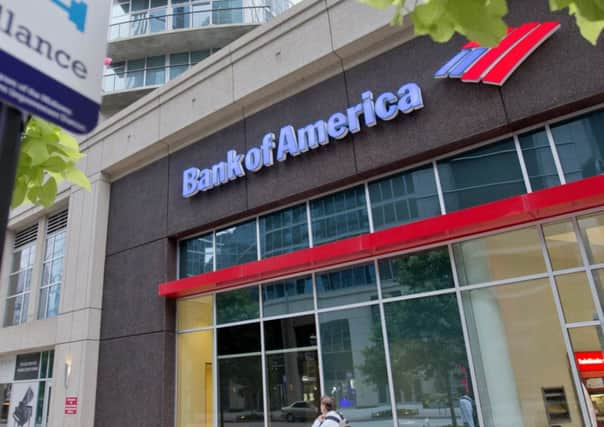Martin Flanagan: Rogue banking penalty | Co-op


In an era of low interest rates banks went searching for better “yield” on their cash. One twilight area they entered was “sub-prime”: selling ultra-cheap mortgages to poor Americans with chequered credit histories, who couldn’t afford to make the repayments when interest rates rose.
Worse, those bad mortgages were bundled into opaque packages of bonds and derivatives that were then traded between banks in what became a pass-the-bad-debt timebomb for the industry. It was esoteric, acronym-spattered banking that few people understood, with sub-prime giving birth to the troubled children of CDOs (collateralised debt obligations), SIVs (structured investment vehicles), Ninja loans (no income, no job or assets) etc.
Advertisement
Hide AdAdvertisement
Hide AdIn this greedy, hubristic and incompetent period, individual bank rogue traders were also skiing disastrously off-piste. Their activities cost Société Générale losses of $7.2bn, Allied Irish Banks $691 million and National Australia Bank $268m.
Even in 2012, when the worst of the crash was over, a trader at UBS was jailed for rogue trading that ran up losses of $2.3bn.
Fast-forwarding, last week’s Bank of America (BoA) settlement agreement is the latest in a stream of legal resolutions of dodgy mortgage security selling. The likes of JP Morgan Chase, Citigroup, Deutsche Bank, Morgan Stanley and UBS have all had their time in the public dock.
But BoA is a milestone, the biggest ever settlement between US authorities and a single company. American politicians are right in saying it demonstrates no financial institution, no matter how apparently august, is beyond the long arm of the law in chasing down financial fraud.
The bank admitted to “repeated failures” to inform investors of the risky quality of the mortgages that were packaged and sold as securities by itself and its subsidiaries, Countrywide Financial and Merrill Lynch.
In all, BoA has paid an eye-watering $50bn in American government settlements for mis-selling mortgage-backed securities since 2009.
Such settlements on sub-prime can be seen as the revenge of Main Street USA on Wall Street. The US public was justifiably critical after the crash that the authorities seemed not to be adequately punishing the bad banking behaviour that precipitated the worldwide crisis.
Few would level that allegation now. Of course, we in Britain are in no position to crow. Our major banks have all suffered severe regulatory financial hits around issues such as rigging the Libor rate and mis-selling payment protection insurance (PPI). Lloyds even tried to rip off the Bank of England on the terms for taking the central bank’s financial lifeline in the crash. Talk about biting the hand that feeds you.
Advertisement
Hide AdAdvertisement
Hide AdThere will be other shocks to the banking system. Bob Diamond at Barclays was plain wrong a few years back when he said the “time for remorse is over”. But the Bank of America landmark penalty, among a swathe of others on both sides of the Atlantic, and tougher bank regulation globally, suggests that, slowly, the worst of the excesses of the early millennium are being sorted.
Tough job to put Co-op back in ethical credit
THERE seems to be a “flight from ethics” at the Co-op Bank. Flippancy aside, it is a serious blow for the bank that customers have been leaving in droves since its scuppered bid for 600 Lloyds branches last year led to the discovery of a £1.5 billion hole in the balance sheet and its near-collapse.
Although it is better news that Co-op Bank cut its losses to £75.8 million in the first six months of 2014 from £844.6m, it is still indicative of the major reputational problems it faces that 38,000 current account numbers left the bank in the period.
True, the self-styled “ethical bank” also picked up some new customers, making the net customer loss 2 per cent of the total. But it still means that a decent-sized football stadium of customers have voted with their feet following the grotesque catalogue of disasters at the Co-op Bank and its parent, Co-op Group.
Where to now for the bank? Probably not a flotation. There is still too much restructuring work to do, as well as returning the bank to a profit, the latter unlikely before 2016.
The best that can be said for the business is that, although it flirted with collapse, it did not have to seek a taxpayer bailout in the way Royal Bank of Scotland, Lloyds, Northern Rock and Bradford & Bingley did.
For this relief, much thanks. But you wonder whether too much damage has been done to a self-consciously alternative brand for it to be viable in the medium-term.
It is one of those strange cases where if the Co-op Bank brand had not existed you could see a case in these times to invent it as an antidote to unethical practice elsewhere.
Advertisement
Hide AdAdvertisement
Hide AdBut, already in existence and having come up seriously short in governance and performance in the full glare of public scrutiny, does it really merit a continuing independent existence? In short, the Co-op Bank’s renewal is a long-term job that might not be worth the candle at the end of the journey. «
• Twitter: @martinflanagan8